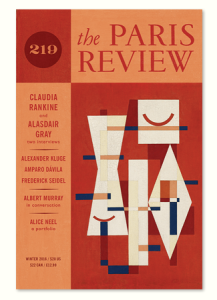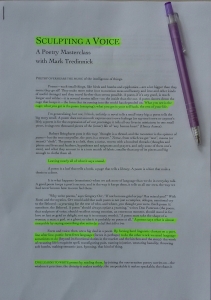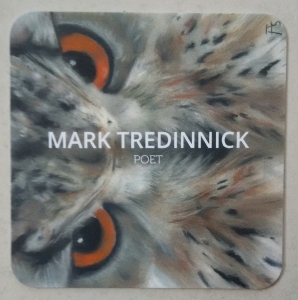You are currently browsing the tag archive for the ‘Seamus Heaney’ tag.
I’ve recently discovered a series of interviews with poets in The Paris Review through one of my poetry groups and what a find it’s proving to be.
The Paris Review is a quarterly journal out of New York all about the arts – be it poetry, memoir, fiction, photography, film, painting, theatre – anything creative they’ve got it covered.
With the first chatting to T.S. Eliot in 1959, The Art of Poetry interviews provide an invaluable insight into some of the world’s finest poets – A.R. Ammons, Elizabeth Bishop, Billy Collins, Allen Ginsberg, Seamus Heaney, Ted Hughes, Philip Larkin, W.S. Merwin, Marianne Moore, Les Murray, Robert Pinsky, Anne Sexton to name a few.
An interview to stand out was with Henri Cole, a Boston-based poet who’s published eight books of poetry to date with the next out shortly. Cole describes himself as an autobiographical poet finding pleasure ‘from assembling language into art’ and believes a poem is something to be made. When not writing, Cole maintains an ideas envelope – snippets of thoughts, lines, images, overheard conversation – essentially an array of prompts to help him ‘when he sits down cold.’
Which has inspired me to start one of my own for the new year, so best get to it.
Mark Tredinnick was in town over the weekend to run two workshops at the SA Writers Centre, the second of which I attended to learn about voice in a poem, or quite often, voices.
I first met Mark at the launch of Australian Love Poems, which he edited and then again in a workshop he ran last year. Mark is a brilliant poet with an amazing track record; winner of the Montreal Poetry Prize in 2011 and the Cardiff International Poetry Prize in 2012, author of Bluewren Cantos, Fire Diary, and several other celebrated works of poetry and prose.
The workshop explored the discipline of fashioning a poem, the importance of form, voice and language, and the linguistic choices poets are forced to make. Why that form over another, why the line break there, why that word instead of this one – these were just some of the questions posed as we examined pieces by John Glenday, Seamus Heaney and Charles Wright.
Mark also shared with us what he believes and how he works, The Gospel of Mark, with some very salient points:
- A poem is a leaf that tells a tree
- The words in a poem are only there to keep the silence apart
- A poem is a sculpture of voice
- Poetry recasts life’s exquisite spell
- Each line in a poem is a poem
- A poem is a window
It was thought provoking stuff that generated fascinating discussion and insight, and certainly for me, another poem to develop. And just how fab are Mark’s business cards, puts mine to shame!
I gave Mark a copy of my chapbook after as I’m keen to get his thoughts on it. Another participant presented Mark with a bottle of wine from her own winery having attended both workshops, so I recommended he have that open while reading my collection 😉
Apart from reading, and reading widely, another good tip for a poet is to subscribe to some poetry journals and writing magazines, to also help keep them appraised of the latest events in the literary world. I currently subscribe to seven publications, a mixture of pure poetry, book reviews and general writing, one of which is Mslexia.
This magazine, published out of Newcastle upon Tyne in the UK, prides itself on being an ambassador for women’s writing, to get their voices heard in what can still be construed as a rather male-dominated field. An interesting article in the current issue focuses on ‘bestselling poets’, with only three in the top ten prime sellers actually being alive at the moment.
Not surprisingly Carol Ann Duffy tops the charts, with an increase in her sales income on last year by just under £20,000 to £195,992. I love Duffy’s work, the rawness and reality of it, two of my favourite pieces being from her collection of Love Poems, ‘Drunk’ and ‘Valentine’, in which she picks you up and makes you ‘be’ in the scene with her.
There’s an even split in the top ten in respect of gender, which includes the likes of Heaney, Plath and Armitage, and the piece reminds us that the poet’s income is a mere ‘pittance’ compared to the bestsellers in other genres, giving the example of historical fiction queen Philippa Gregory who earned close to £1 million this year.
And so it ends with the advice of don’t give up the day job, which is all too true. I have been lucky enough financially to be able to reduce my working hours for the first time in my life to focus purely on my poetry but yes, poets face an interesting challenge – to dream in a realist world.





